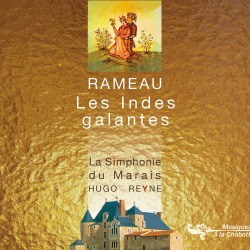
Support us financially by purchasing this from |
 |
|
Jean-Philippe RAMEAU (1683-1764)
Les Indes galantes
– Opéra ballet in a prologue and four entrées (Libretto by Louis
Fuzelier) (1735-1736)
Valérie Gabail (soprano): Amour, Phani, Fatime, Zima; Stéphanie Révidat (soprano): Hébé, Émilie, Zaïre; Reinoud van Mechelen (haut-contre ten): Carlos, Damon; François-Nicolas Geslot (haut-contre ten): Valère, Tacmas; Aimery Lefèvre (bass-baritone): Bellone, Osman, Huascar, Ali, Adario; Sydney Fierro (bass-baritone): Alvar
Le Choeur du Marais; La Simphonie du Marais/Hugo Reyne
rec. live, 26-27 January 2013, Konzerthaus, Vienna. DDD
MUSIQUE À LA CHABOTTERIE 605013 [3 CDs: 67:13 + 58:07 + 66:37]
In the bad old days of period Baroque revival, there was almost an assumption that second-rate voices would do to sing the music because the best artists were concentrating on Mozart, the Romantic composers and beyond. The tide started to turn when great singers like Janet Baker, John Shirley-Quirk, Gérard Souzay, Nicolai Gedda and Jeanette Scovotti began to record Rameau. Even Beverly Sills and Placido Domingo took part in a live performance of Hippolyte et Aricie in Boston in 1965. Nonetheless, it seems to me that either vestiges of that attitude still linger or it remains difficult to attract the best voices to perform Rameau’s operas. Perhaps this is because of some perceived stylistic barrier preventing them from turning their attentions to the late seventeenth and mid-eighteenth century French and German repertoire.
I have thus reviewed several such works recently which suffer from a lack of real quality singing. The most recent was Boxberg’s Sardanapalus and Lully’s Amadis. I love Rameau’s keyboard suites and certain of operatic arias so I was hoping for better from this revival of a new, full, revised edition of “Les Indes galantes” but my hopes were only partially realised. Too many voices here lack body. The first we hear in the Prologue is a rather indifferent soprano singing Hébé; she is somewhat shrill of tone and prone to squeezing, then the supposed bass-baritone as Bellone sounds nothing like one, having weak, growling low notes and a ponderous manner. What a pity the wonderful young French baritone Edwin Crossley-Mercer was not cast here. Valérie Gabail is none too steady or sweet-toned as L’amour”, her wobble and approximate high notes really will not do.
So vocally the Prologue remains a disappointment; however, the novelty of the musical invention and the vivacity of instrumentation bring real compensation, featuring gutsy strings, a delightfully wheezy “musette” (bagpipes), blaring, valveless trumpets, bird-like flutes and mellow recorders, all underpinned by some splendid timpani. I really commend the energy of the conducting and the accuracy of the playing, and am only sorry that the standard of singing does not match the virtuosity of the band.
In the first “Entrée” the same first soprano and bass-baritone take the roles of Émilie and Osman (the eponymous “Turc généreux”) and are heard to be singing themselves into somewhat better voice. “Tempête” (track 28) is great fun instrumentally and the chorus is good, too, but the solo vocalism verges on the painful. Haut-contre tenor François-Nicolas Geslot as Valère gives me little pleasure. There are – or have been -singers who can manage this specifically French Baroque tessitura attractively but Geslot is thin-voiced and strained. Nobody makes a very good job of the coloratura passages, often running out of breath required to sustain a pleasant tone (for example track 38 and at the end of track 39, CD1).
The best things here are the choral numbers and set-piece dances like the “Air pour les Esclaves Africains” with its emphatic “Turkish-style” tambourine shakes.
This pattern of continues throughout the four Acts: some splendidly vivacious instrumental interludes and set pieces alternate with some very indifferent singing such as the strained, throaty singing from the other haut-contre tenor Reinoud van Mechelen. I particularly enjoyed the central “sun worshipping” section of “les Incas du Perou” leading up to the famous and, for its time, innovatory, earthquake and in the ”Ballet des fleurs” which concludes the “Fête persane” is very attractive but It is such a pity that the standard of vocalisation does not match the standard of playing.
The sound is very good, with a nice balance between voices and instruments, and coughing is minimal. The cello and harpsichord continuo is tastefully judged and ornamented.
The presentation is a handsome gold cardboard digipack containing a 120 page booklet with a full French libretto (no English translation), synopses and biographical and musicological notes in French and English.
This is in many ways a laudable and valuable issue, being so thorough, scholarly and complete; I only wish that the singing did not compromise its quality.
Ralph Moore
 |
 |
|











